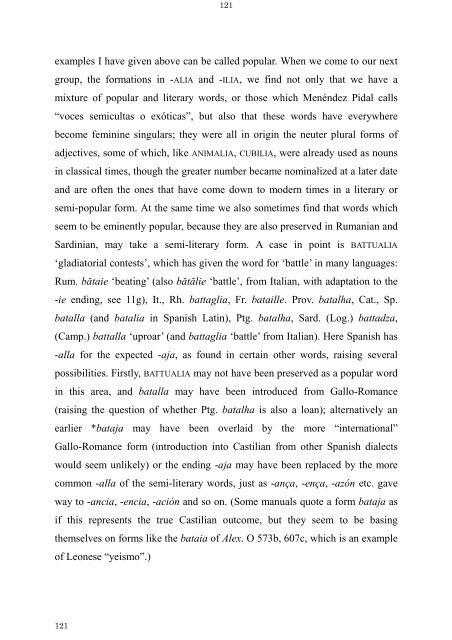The Latin Neuter Plurals in Romance - Page ON
The Latin Neuter Plurals in Romance - Page ON
The Latin Neuter Plurals in Romance - Page ON
Create successful ePaper yourself
Turn your PDF publications into a flip-book with our unique Google optimized e-Paper software.
121<br />
121<br />
examples I have given above can be called popular. When we come to our next<br />
group, the formations <strong>in</strong> -ALIA and -ILIA, we f<strong>in</strong>d not only that we have a<br />
mixture of popular and literary words, or those which Menéndez Pidal calls<br />
“voces semicultas o exóticas”, but also that these words have everywhere<br />
become fem<strong>in</strong><strong>in</strong>e s<strong>in</strong>gulars; they were all <strong>in</strong> orig<strong>in</strong> the neuter plural forms of<br />
adjectives, some of which, like ANIMALIA, CUBILIA, were already used as nouns<br />
<strong>in</strong> classical times, though the greater number became nom<strong>in</strong>alized at a later date<br />
and are often the ones that have come down to modern times <strong>in</strong> a literary or<br />
semi-popular form. At the same time we also sometimes f<strong>in</strong>d that words which<br />
seem to be em<strong>in</strong>ently popular, because they are also preserved <strong>in</strong> Rumanian and<br />
Sard<strong>in</strong>ian, may take a semi-literary form. A case <strong>in</strong> po<strong>in</strong>t is BATTUALIA<br />
‘gladiatorial contests’, which has given the word for ‘battle’ <strong>in</strong> many languages:<br />
Rum. bătaie ‘beat<strong>in</strong>g’ (also bătălie ‘battle’, from Italian, with adaptation to the<br />
-ie end<strong>in</strong>g, see 11g), It., Rh. battaglia, Fr. bataille. Prov. batalha, Cat., Sp.<br />
batalla (and batalia <strong>in</strong> Spanish <strong>Lat<strong>in</strong></strong>), Ptg. batalha, Sard. (Log.) battadza,<br />
(Camp.) battalla ‘uproar’ (and battaglia ‘battle’ from Italian). Here Spanish has<br />
-alla for the expected -aja, as found <strong>in</strong> certa<strong>in</strong> other words, rais<strong>in</strong>g several<br />
possibilities. Firstly, BATTUALIA may not have been preserved as a popular word<br />
<strong>in</strong> this area, and batalla may have been <strong>in</strong>troduced from Gallo-<strong>Romance</strong><br />
(rais<strong>in</strong>g the question of whether Ptg. batalha is also a loan); alternatively an<br />
earlier *bataja may have been overlaid by the more “<strong>in</strong>ternational”<br />
Gallo-<strong>Romance</strong> form (<strong>in</strong>troduction <strong>in</strong>to Castilian from other Spanish dialects<br />
would seem unlikely) or the end<strong>in</strong>g -aja may have been replaced by the more<br />
common -alla of the semi-literary words, just as -ança, -ença, -azón etc. gave<br />
way to -ancia, -encia, -ación and so on. (Some manuals quote a form bataja as<br />
if this represents the true Castilian outcome, but they seem to be bas<strong>in</strong>g<br />
themselves on forms like the bataia of Alex. O 573b, 607c, which is an example<br />
of Leonese “yeismo”.)









